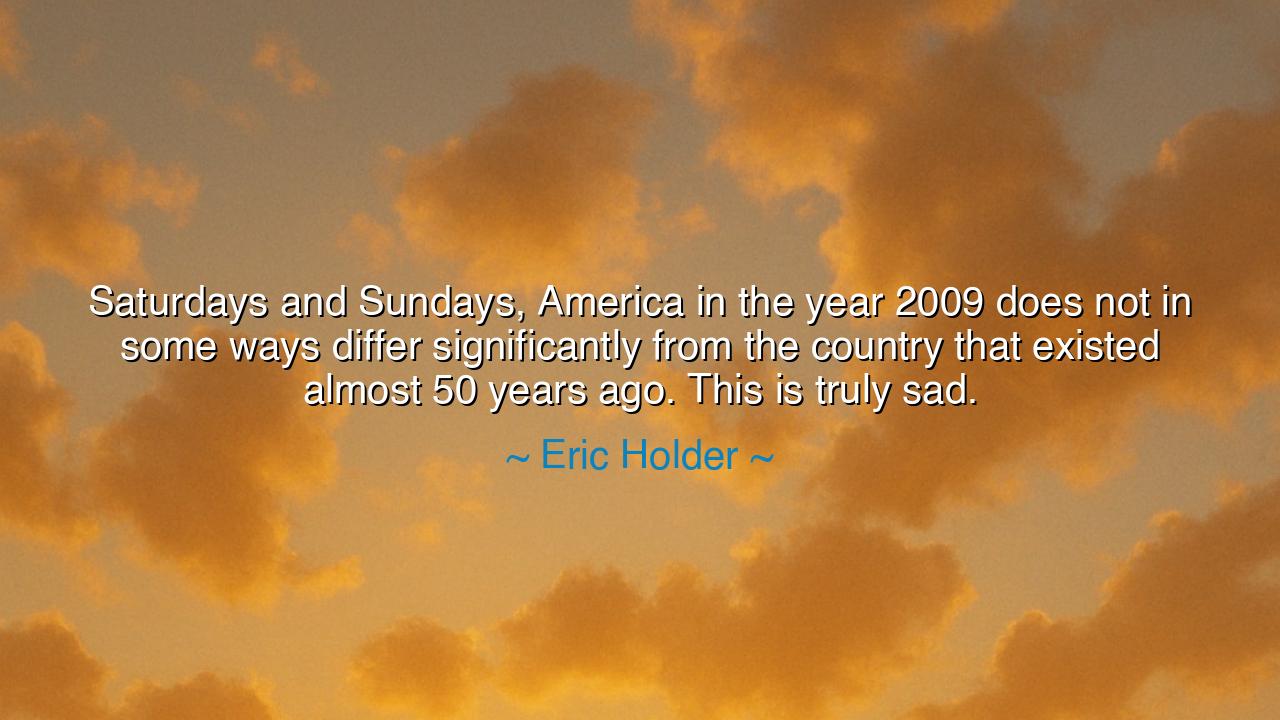
Saturdays and Sundays, America in the year 2009 does not in some
Saturdays and Sundays, America in the year 2009 does not in some ways differ significantly from the country that existed almost 50 years ago. This is truly sad.






The words of Eric Holder, “Saturdays and Sundays, America in the year 2009 does not in some ways differ significantly from the country that existed almost 50 years ago. This is truly sad,” echo like a lament carved into the heart of a nation. Beneath their measured tone lies both grief and warning—a sorrow for the stagnation of the human spirit and a reminder of how slow the progress of unity can be. Spoken decades after the marches of the civil rights era, Holder’s reflection does not describe nostalgia, but disappointment: that despite laws passed and barriers broken, the walls of division between communities still stand quietly, rebuilt each week in invisible ways.
In the context of his speech, Holder was addressing the persistent racial and social separation that lingered in American life. Monday through Friday, the nation worked together—its citizens sharing offices, schools, and marketplaces—but when the weekend arrived, the old habits of segregation reappeared. On Saturdays and Sundays, when people chose freely where to worship, where to gather, and whom to call friend, they often retreated into enclaves of sameness. In these two days of rest, the truth of the heart was revealed: that comfort still lay in familiarity, not in unity. Holder’s sorrow, then, is the sorrow of one who sees how outward progress can conceal inward distance.
The ancients, too, understood that law cannot change the soul unless the soul desires transformation. The philosopher Aristotle wrote that the purpose of law is to make men good, but that true virtue arises only when habit becomes love of the good itself. Holder’s lament reflects this same truth in modern form. Decades of legislation had ended legal segregation, but the division of spirit—born of fear, ignorance, and inherited prejudice—remained unhealed. The nation had advanced in form but not yet in heart. Thus, his words are both observation and challenge: that the real battle for equality must be fought not in courtrooms, but in communities, within the quiet choices people make when no one is watching.
History offers many such mirrors. Consider the struggle of Nelson Mandela, who upon leaving prison sought not revenge but reconciliation. He understood that while apartheid could be abolished by decree, reconciliation must be lived, practiced daily in the fabric of ordinary life. He donned the jersey of South Africa’s rugby team—a symbol once despised by his people—and by doing so, turned a game into a gesture of unity. Mandela’s wisdom teaches what Holder’s words mourn: that the healing of nations depends not on policies, but on the willingness of hearts to cross boundaries. A country that remains divided in spirit, even when free in law, carries within it a quiet sadness that no progress can hide.
The tragedy of Holder’s statement lies not in despair, but in its truth. It reveals how easily humanity forgets that freedom is not a destination, but a discipline—a constant choosing of understanding over indifference, of empathy over comfort. The repetition of the old divisions on weekends is symbolic of a deeper condition: the yearning to belong, twisted into the habit of exclusion. It is easier to stay among one’s own kind than to reach across difference. Yet this ease is the enemy of growth. As long as men and women seek refuge in sameness, the dream of a shared nation remains half-awake, suspended between progress and paralysis.
And yet, Holder’s lament is not without hope. To name sadness is the first step toward healing it. By saying that the lack of change is “truly sad,” he invites not condemnation but reflection. He calls the nation to see itself clearly—to measure not its achievements, but its connections; not its freedoms, but its friendships. For what good is liberty if it does not lead to fellowship? What meaning has equality if it is not practiced in the intimacy of daily life? The work of justice is not only to pass laws but to open hearts, to replace inherited suspicion with chosen compassion.
So let this teaching be passed down: do not mistake progress for peace. A people may change their institutions yet remain strangers to one another. Every generation must confront anew the divisions it inherits, and every individual must decide whether to perpetuate them or to heal them. As Eric Holder reminds us, the true measure of civilization lies not in what we declare during the week, but in how we live when we are free to choose. Let us then use our Saturdays and Sundays—the sacred pauses of life—not to retreat into separation, but to practice the fellowship that laws alone can never create. For only when unity becomes our habit will the sadness he spoke of finally fade, and the promise of equality become not aspiration, but truth.






AAdministratorAdministrator
Welcome, honored guests. Please leave a comment, we will respond soon